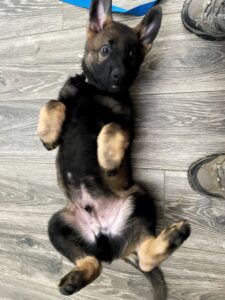Table of Contents
How do You Potty Train a German Shepherd?
I have potty trained a lot of dogs and by far my German Shepherd was the easiest to train. As with all dogs potty training a German Shepherd can be a challenging task, but with consistent efforts and patience, it turns out to be a rewarding experience. This article is about how to potty train a German Shepherd.

I have my breeder to thank for how easy it was to potty train Jasper. She started training her litters to the smell of alfalfa hay which she spread out first in the whelping box and later outside. Before I bought Jasper home I bought a box of hay. He seemed to immediately know what I wanted him to do when I took him to the place I chose and had hay laid out on.
Know Your Puppy’s Limitations
I once had a teenage mother come into where I worked and say she was training her 6-week-old son to “hold it” because he needed to learn not to mess up so many diapers. I queried, so how are you doing that? Easy, I only allow him 4 diapers a day. If he goes more than that he just has to lie in it. We had a conversation about babies being neurologically incapable of “holding it” but I don’t think she believed me. I often wonder what became of that baby. Nothing good I would imagine.
So, it’s important to understand the dog’s physiology. German Shepherds, like other puppies, have small bladders and cannot control their urges for long. Therefore, frequent potty breaks, at least once every hour, are crucial. If your puppy has an accident it is more than likely your fault so roll up a newspaper and hit yourself on the head if you need to hit anyone!
How Long Can a German Shepherd Puppy Hold his Pee?
Experts say your puppy can hold it for about an hour for each month of age. However, that’s talking about crate time. If your puppy is outside the crate and you are playing watch him closely for sniffing behavior and take him out every 20 minutes or so. I also strongly suggest your puppy should never be out of the crate if you are not actively watching him.
X is the Spot
Start with a designated potty spot, ideally outside your house. Every time your puppy feels the urge or after every feeding, drink and play period guide them to this spot. This consistent action helps the dog associate this place with their toilet. A leash might help lead them to the spot quickly and easily.
Dogs Like to be Paid Too
Positive reinforcement plays a vital role in training German Shepherds. Dogs of this breed are known to respond well to praises and treats. Whenever your pup successfully goes to the potty in the designated spot, generously praise them or reward them with a treat. This will encourage them to repeat this behavior.
Crate Training; How do I keep my German Shepherd from Peeing in the House?
Crate training can also be a helpful tool. Dogs instinctively do not want to soil their sleeping areas, so confining them to a crate during the night or when they can’t be supervised can help teach bladder control. But remember, puppies can’t hold it for very long, so frequent breaks are still necessary. You will generally bring your puppy home at 8 weeks. At that age the longest you can expect him to hold it would be two hours. And yes, that includes at night, and also in the rain and snow!
I did not follow this advice with my small dogs and to this day they are not dependable on house training and can’t be allowed free run of the house. Sigh. Nobody to blame but myself. To be fair I did not know the importance of management in house training at the time, but still.
Establishing a Routine
Establishing a routine is another effective training strategy. All dogs sort of like young children thrive on routine. Feed your German Shepherd at the same time every day and take them outside after meals, as puppies usually need to relieve themselves 10-20 minutes after eating.
Be Prepared for Anything
Be ready to clean up any messes that occur during the training process. Have a few rags and cleaners near your puppy’s designated potty spot so you can properly sanitize if accidents happen. Cleaning these messes thoroughly is important as dogs are sensitive to smell and may return to the same spot if they detect familiar scents.
Accidents Happen
Accidents will happen, so when they do, it’s important not to freak out or punish your dog. Instead, clean up the mess quietly and continue the training. Use an enzymatic cleaner to remove any smell that might attract the puppy back to the spot to relieve itself.
Never rub your dog’s nose in it! All this teaches your dog is you have a strange human fetish about pee and aren’t very nice. The only time you should say anything about an accident is if you catch them in the middle of making one and even then just calmly say no scoop him up and take him outside.
Dogs have a learning window of 1 second. Your dog will have no idea what you are mad about 5 minutes after the deed. All yelling or hitting him(tell me you do not hit your dog please!) will do is make him not trust you. It may make you feel better but it will teach the dog nothing except he can’t trust you and he should fear you.
You want to be the source of everything good, not something to fear.
It Really is Up to You
Housetraing doesn’t have to be hard if you manage your dog. He should be in the crate if you are not interacting with him. If he is out of the crate he should be on a house line.(A short leash he drags around, making it easier for you to keep him out of trouble and close to you) Full access to your house should be done very slowly. In general, your dog may need to be as old as two before he’s ready for that freedom.
If you come home and your puppy has eaten a hole in your wall and chewed up your favorite pair of shoes, you likely gave him too much freedom. Don’t yell at your puppy, yell at yourself for making a bad choice and restricting your pup’s freedom.
Finally, patience and consistency are key. Potty training doesn’t happen overnight, and it might take several weeks to months for your German Shepherd to be fully house-trained. But with these tips and a little perseverance, you’ll have a well-trained, happy German Shepherd.
Conclusion
Training a German Shepherd can be an extremely rewarding experience. This loyal, smart breed is eager to please and loves to learn new things. With patience, consistency, and lots of treats, you can have a potty-trained pup in no time! Try taking your puppy outside after meals or naps; bring him on regular walks; use positive reinforcement for good behavior; and be sure to practice the same schedule each day. With patience, consistency, and a reinforced routine, potty training your German Shepherd will become second nature!
Remember that crate training can also be an effective tool for housetraining. If you find your pup has an accident in the house despite all of your best efforts, don’t scold or punish him. Instead, address the issue calmly and take him outside to encourage success. Lastly, be sure to give your pup plenty of praise when he goes in the right spot! With positive reinforcement, patience, and consistency, you’ll have a loyal and well-trained German Shepherd in no time. Good luck!
